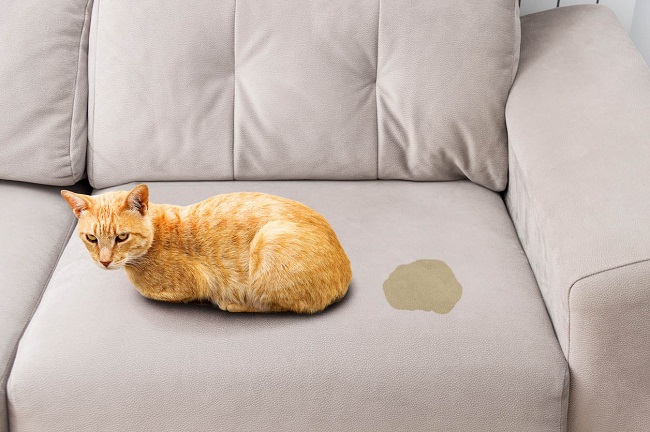Being a cat parent, you’ve likely experienced the strong, unpleasant odor of ammonia in cat pee. This common issue leaves many wondering about the reasons behind the odor and how to manage it.
In this comprehensive guide, we’ll delve into the causes of the ammonia scent in cat pee, what it may signify about your feline’s wellbeing, and how to address it effectively.
 Ammonia Cat Pee
Ammonia Cat Pee
Why Does Cat Pee Smell Like Ammonia?
The main reason cat pee smells like ammonia is due to the presence of urea, a waste product of metabolism that cats excrete through their urine.
Read Also:
When left uncleaned, bacterial activity breaks down the urea, releasing ammonia gas, which gives off the strong, distinctive odor.
Factors Affecting the Ammonia Scent in Cat Urine
The intensity of the ammonia scent can be influenced by several factors. These include your cat’s hydration levels, diet, age, and overall health. Dehydration can concentrate the urine, making the smell stronger.
Similarly, certain foods can affect urine odor. As cats age, their kidneys may function less efficiently, leading to more ammonia in the urine. Additionally, certain medical conditions can make the urine smell stronger.
Health Implications of Strong Ammonia Smell
While a mild ammonia scent is typical in cat urine, a strong, persistent smell could indicate a health issue, such as a urinary tract infection, kidney disease, or diabetes.
If you notice a change in the smell of your cat’s urine, along with other signs of illness like increased thirst, lethargy, or changes in appetite or behavior, consult a vet immediately.
Managing the Ammonia Smell in Cat Urine
There are various ways to manage the ammonia smell. Maintaining proper hydration and a balanced diet can help. Regularly cleaning the litter box can prevent the buildup of ammonia gas.
Using an odor-controlling litter and providing adequate ventilation can also reduce the odor. If the smell persists despite these measures, it’s crucial to consult with a vet to rule out any underlying health issues.
The Role of a Vet in Addressing Ammonia Odor
A vet can play an essential role in addressing issues related to ammonia in cat urine. They can perform tests to detect any underlying health problems causing the strong smell. Depending on the diagnosis, they may recommend treatments or dietary changes.
Preventive Measures Against Strong Ammonia Smell
Prevention is always better than cure, and this holds true when dealing with the strong smell of ammonia in cat urine. Here are some preventive measures to ensure that the ammonia smell does not become a persistent problem in your household:
Regular Vet Check-ups: Regularly taking your cat to the vet can prevent many health issues. A routine urinalysis can detect early signs of urinary tract infection, kidney disease, or diabetes that might cause the urine to smell stronger.
Proper Hydration: Ensure your cat is adequately hydrated. More water intake leads to dilution of urine, reducing the intensity of the ammonia smell. Keep fresh water readily available for your pet at all times.
High-Quality Diet: Feeding your cat a balanced, high-quality diet can also impact the smell of their urine. Some foods might cause a stronger smell than others. Consult with your vet about the best diet plan for your pet.
Maintain a Clean Litter Box: This cannot be stressed enough – a clean litter box is key to controlling the smell of ammonia. Scoop the box daily, and do a complete change of litter and thorough clean of the box at least once a week.
Read Also:
Conclusion
Understanding the causes and implications of the ammonia scent in cat pee is crucial for every cat parent. While a mild ammonia smell is normal, a strong, persistent odor could indicate a health issue requiring immediate attention.
Regular cleaning, proper diet and hydration, and routine vet check-ups can help ensure your feline friend stays healthy and your home remains fresh.
























